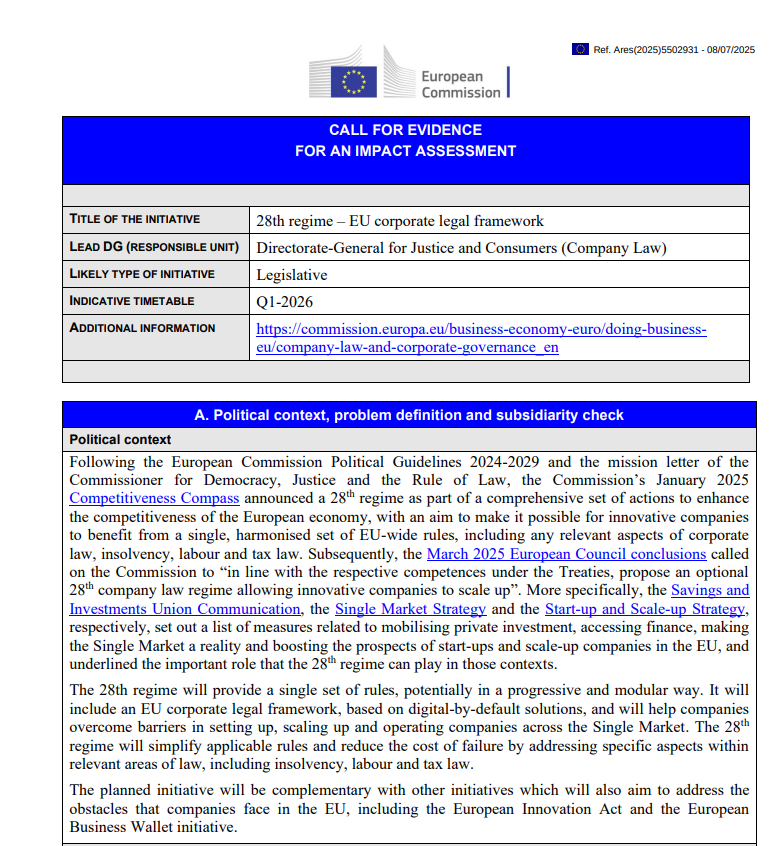The 28th Regime, for which the EU seeks stakeholder input, is an optional, EU-wide legal framework designed to simplify the setting up, operation and cross-border scaling of innovative companies within the Single Market. This new regime aims to provide a single harmonised set of rules – covering key areas such as company law, insolvency, labour and tax law – to coexist alongside national regulations, enabling companies to opt for a streamlined legal structure and reduce administrative burdens and compliance costs. The consultation targets companies, business associations, legal professionals, and academics. It is open until 30 September 2025, with legislative proposals expected in early 2026.
The call for evidence is available here: https://ec.europa.eu/info/law/better-regulation/have-your-say/initiatives/14674-28th-regime-a-single-harmonized-set-of-rules-for-innovative-companies-throughout-the-EU_en
In order to raise awareness about the inclusion and needs of the enlargement countries and more specifically the Western Balkans, the project coordinator Elke Dall provided feedback and input on behalf of POLICY ANSWERS and the Western Balkans Info Hub,
From the perspective of the POLICY ANSWERS project and the Western Balkans Info Hub, it is important to stress from the outset that the chosen terminology (referring to the proposed EU-wide harmonised legal regime for innovative companies as the 28th regime) should NOT be retained in subsequent legislative steps. This label ties the initiative to a fixed number of Member States, which runs counter to the EUs dynamic enlargement policy, particularly as Montenegro, Albania and potentially other economies are expected to join in the near future. A forward-looking and inclusive name would better reflect the EUs evolving composition and embody the spirit of integration and openness that this regime seeks to promote. Building on this, the future harmonised regime should also be genuinely accessible to innovative companies in enlargement economies. Rules and procedures should be designed so that start-ups and SMEs from the Western Balkans and other candidate countries can participate on equal terms, rather than face obstacles arising from digital, financial or administrative gaps. It is essential that the regime actively supports legal certainty and market integration for businesses beyond the current EU-27. The introduction of an EU-wide legal framework will also carry implications for the integration process. A harmonised regime, if well-aligned with EU standards and integration objectives, can serve as a strong incentive and preparatory tool for candidate countries, facilitating their convergence with the Single Market and reducing legal complexity during and after accession. Care should be taken that this regime complements and accelerates, rather than complicates, the path to full EU membership for enlargement countries. SMEs from the Western Balkans face distinct challenges, including fragmented regulatory environments, higher barriers to cross-border scale-up and limited access to administrative and legal support compared to peers in established Member States. By making the harmonised regime truly accessible, the EU would not only ease these constraints but also unlock the entrepreneurial and innovative potential of the region. While supporting enlargement countries is not the primary purpose of the regime, it may be valuable to suggest measures that would facilitate their future participation, such as: providing transitional measures and guidance to help align national legal and administrative systems with the new regime offering technical assistance, shared digital platforms and training for national authorities to implement digital procedures effectively considering regional or cross-border sandboxes, enabling start-ups to test innovative products and services across multiple jurisdictions raising awareness early to ensure that innovators, SMEs and public authorities understand the regime in the context of candidate countries In conclusion, targeted support, capacity building and clear information on the implications for the integration process are needed.

